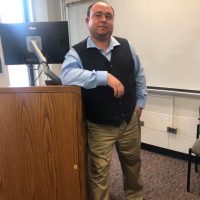Everyone needs to dream big in life.
Goals are the waypoints to those dreams. It was always my goal to go to graduate school.
After my break from first-episode psychosis in undergraduate school, my goal to graduate school was on the brink of failure.
My goal was so important to me that I was uncompromising in my recovery to heal and move on with my life. When goals are critical to us, people will do everything in their power to reach them despite the obstacles in their path.
My obstacle was my schizophrenia diagnosis and the residual symptoms that medication didn’t manage. These obstacles didn’t stop me from applying to a social work program two years later when I finally reached my goal of enrolling in a graduate program.
Because I was marked as sick and mistreated, due to revealing my psychiatric history earlier on in my education, only a few people knew my history.
Aside from my girlfriend, a few close classmates in my cohort, and the people who already knew my schizophrenia diagnosis, I kept my mental health to myself.
Not sharing and being utterly private about my mental health history meant a few things:
>> I would have to be ultra-careful about managing my schizophrenia symptoms.
>> Be mindful of blips or changes (however minor) in my mental status so faculty and other students would not liken the lability to a possible mental health disorder.
>> Be very careful about who I confide in about my history to avoid information falling into the wrong hands or people that might be stigmatizing and discriminatory.
There were times when I could do it all, be mindful, careful about disclosing, and super self-aware without incident. Other times, I found it more difficult to hide who I was and my history as a person with lived experience. When I was happy, content, and not very stressed, being mindful of all of these aspects of being secret about my identity was easy. When there was an exam or a vital essay due, I found myself becoming sad and pensive. It was during these stressful times that I got angry and self-loathing. I became upset about my history and how I was less than completely authentic about who I was and my past.
Graduate school in social work has a big self-reflection piece. One of our educational goals is to become more self-aware of our “stuff.” Together, in class, we unpack the microaggressions and discrimination we’ve internalized our entire life. Meaning, we learn why and how our perception is shaped by the societal apparatuses which inform our everyday mindset and way of interacting with our peers and family. So, when this aspect of graduate school came around, and it was my time to reflect and learn about myself, I knew I would have to be very careful about how I went about this process.
I didn’t have the option. I could not openly reflect on my past because I had chosen to keep that piece of me a secret. I could make up a past and reflect on a fictitious history to practice the art of telling a compelling yarn. For a while, this is what I did. At first, it seemed phony. The content of the stories I spoke about my past were all made-up lies. I made up some outrageous stories. When it came to writing my autobiography, an exercise we all had to do, I was left with the creative freedom to enmesh my history into an outrageous, downright hysterical backdrop. Other students laughed when I told these stories, and they were so artfully crafted and congruent with social work theories of human development, the professor couldn’t deduct points.
I was relentless about lying when I needed to defend my history. But when it came to being honest, and opportunities presented themselves to be me without any of the phoniness, I made the most out of it each time. I was brutally honest. It almost seemed to align with the phony storylines I created earlier on. I still remember a professor talking to us about our dreams to motivate us and get to know a bit of what we were interested in for the end-of-the-year research project just around the corner. I remember the first few responses. “Getting married, owning a big house, being a social worker of the year…” and so forth. No one was expecting to hear what I was about to say.
“I want to move into assisted living,” I told the class.
My classmates laughed harder than ever. But I was serious this time. They just had no idea why. I was exhausted from being overmedicated and extremely tired from my graduate school program. After all, I was in a state hospital two years before this, and now I was in graduate school and a relationship. It was a lot.
So when it came to my dream in life, it was to finish the program, get my master’s, and move into a setting where the assisted living center took care of my meals and cleaning. I certainly didn’t want to move back in with my parents. They were exhausted from caring for me to this point.
With my master’s in social work and a full-time job, I figured I could pay for an assisted living center to do everything for me. I could then focus on taking care of myself and reaching my goals. When you are tired and overmedicated, goals seem further away. They might even feel or seem unreachable at times when someone is cooking your meals, cleaning your living space, and basically, managing your ADL’s (activities of daily living). There is more time and energy to focus on goals, a job, and doing everything everyone else does but with some assistance at home.
“What? Max?” Another student said. “You’re kidding, right?” said yet another student. That was when I explained myself. I didn’t disclose my mental health disorder. But I did explain how tired I was and how much time and energy housekeeping can absorb. I explained how all this energy could be invested into pursuing my dream career or any goal I set for myself.
When I put it in these terms, “energy” and “time,” suddenly everyone knew what I was talking about with my assisted living response. If I had said my answer was because of a mental health disorder, everyone would have pitied me and felt awful. When I made it about being savvy about how I expended my energy and time, everyone thought I was intelligent, innovative, and so forth.
My point is that stigma goes deep, and if people let themselves, they can become blinded by discrimination. Suppose people choose to be more open and nonjudgmental with their thinking. New ways of understanding the world and reaching your dreams might be next.



Read 0 comments and reply